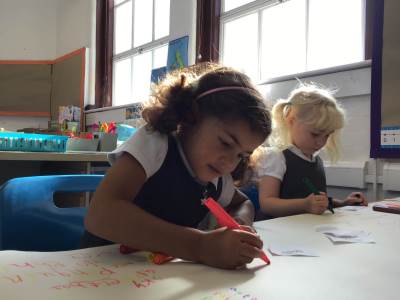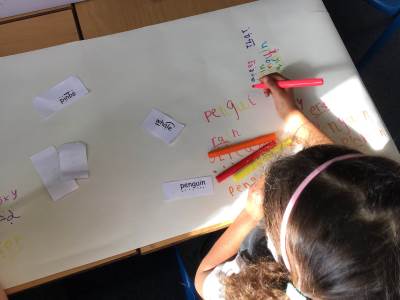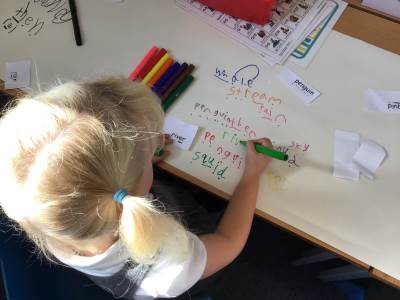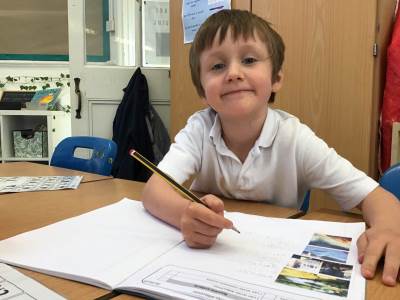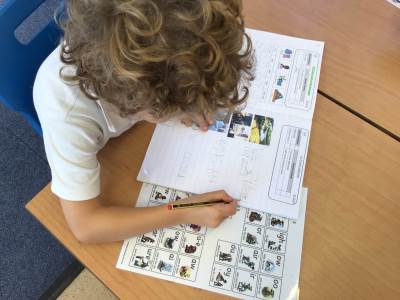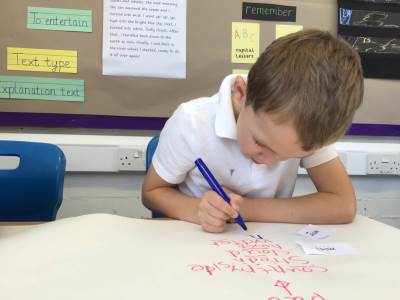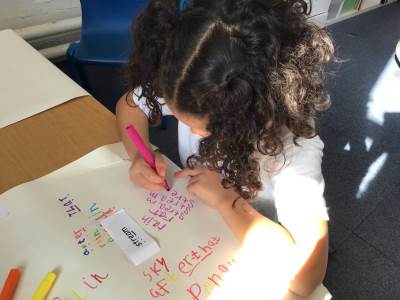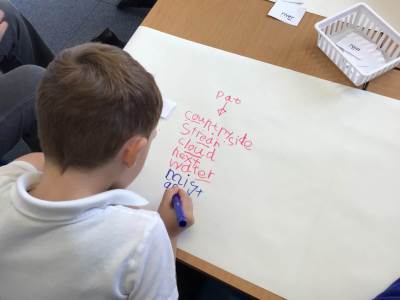English
Intent
The teaching of English at Sidlesham aims to foster a love of speaking and listening, reading and writing that will last them a lifetime. Giving pupils the key skills in English enables them to access material in all curriculum areas, and provides a foundation for their learning throughout their education. To achieve this, teachers are focussed on making English experiences immersive, exciting and engaging. At Sidlesham we view the teaching of English as a fundamental part of the holistic development of our children, fostering positive behaviours and attitudes toward learning, and providing key knowledge and skills, to benefit pupils throughout their education and beyond.
English at Sidlesham
We are committed to achieving the following aims for all our children:
- Reading - Children will be immersed in a strong reading culture where they will be inspired and supported to see themselves as readers, understanding its value and purpose.
- Writing - Children will be immersed in a writing culture; seeing themselves as writers, understanding its purpose and process and developing their voice as articulate and imaginative communicators.
-
Speaking and Listening - Children will be confident, engaging and inspiring public speakers, who value listening in order to learn.
Reading
Reading Intent
Any book which helps a child form a habit of reading, to make reading one of his deep continuing needs, is good for him.
Maya Angelou
At our school, we are committed to developing confident, fluent readers who have a lifelong love of reading. We follow the Read, Write Inc. phonics programme to ensure that every child builds a strong foundation in decoding and word recognition. Once children have successfully completed the phonics programme, we guide them through the process of becoming independent, free readers, encouraging them to choose their own books while continuing to support and extend their reading development.
Reading is at the heart of our curriculum because it unlocks learning in all subjects, expands vocabulary, and nurtures creativity and critical thinking. Through whole-class reading, we immerse children in a broad range of high-quality texts, exposing them to diverse genres, cultures, and perspectives. This not only develops their comprehension skills but also broadens their general knowledge and fosters empathy. We explicitly teach children how to answer different types of questions and encourage them to engage in meaningful discussions about texts. As they become fluent readers, we equip them with the skills to skim and scan for key information, enabling them to read efficiently for purpose as well as for pleasure. Ultimately, our goal is for every child to develop a lifelong love of reading, recognising it as a source of knowledge, inspiration, and enjoyment.
Reading Implementation
Fluency
Children’s fluency and confidence when reading is the key to them seeing themselves as readers and enjoying reading independently. In EYFS and KS1, children will read books (from primarily RWI) linked to their phonics stage, when ready and will take home a phonetically fully decodable book for home reading as well as ‘a challenge book’ they can enjoy with an adult. The transition from phonics readers to ‘free readers’ will be carefully managed when each child is ready as the school recognises that it is at this point that children need input about which books are suitable for them and which books they may enjoy. Normally this transition happens when a child completes the RWI scheme and they can read 90-100 words per minute with expression and a good level of understanding. Class teachers will know and be able to recommend books to their class and will chat to the children about the books they are reading at home. In EYFS and KS1, children will be listened to reading at least once a week. Reading at home may be monitored via a Reading Record Book. In KS2, children's fluency will be monitored at least once a week.
Reading Skills
Children will experience reading lessons from Year 1 to 6, where they will be explicitly taught the skills to unpick a text through whole class reading with a focus on: vocabulary, retrieval, inference, prediction, explanation, summarising and sequencing. This will happen verbally through discussion in KS1 and in written answers in KS2. We do not follow a reading scheme but rather a method of teaching, ensuring that teachers ask, and students are familiar with, a range of questions. They allow the teacher to track the type of questions asked and the children’s responses to these which allows for targeted questioning afterwards. The importance of prior knowledge when approaching texts will be central to children achieving success at comprehension.
Reading Environment
Each class will have an enticing book area where books are displayed both forward facing and spine out. Books will be organised in KS2 by genre or author. Children may visit the school library and take books home as well as visiting our local library too.
The National Curriculum
The overarching aim for English in the national curriculum is to promote high standards of language and literacy by equipping pupils with a strong command of the spoken and written word, and to develop their love of literature through widespread reading for enjoyment. The national curriculum for English aims to ensure that all pupils:
- read easily, fluently and with good understanding
- develop the habit of reading widely and often, for both pleasure and information
- acquire a wide vocabulary, an understanding of grammar and knowledge of linguistic conventions for reading, writing and spoken language
- appreciate our rich and varied literary heritage
- write clearly, accurately and coherently, adapting their language and style in and for a range of contexts, purposes and audiences
- use discussion in order to learn; they should be able to elaborate and explain clearly their understanding and ideas
- are competent in the arts of speaking and listening, making formal presentations, demonstrating to others and participating in debate.
Reading Impact
Attainment in reading is measured using the statutory assessments at the end of Key Stage One and Two. These results are measured against the reading attainment of children nationally. Additionally, we use NFER assessments to track children’s progress during the year alongside ongoing teacher assessment notes to build the picture of children’s reading skills. Attainment in phonics is measured by the Phonics Screening Test at the end of Year 1.
Through the teaching of systematic phonics and reciprocal reading, children become fluent readers by the end of Key Stage One. This enables children to focus on further developing their fluency and comprehension skills as they move through the school. Children:
- Are secure in Phase 5 phonics by the time the Phonics Screening Check is administered.
- Are able to read fluently both for pleasure and to further their learning.
- Have a good knowledge of a range of genres and authors.
- Participate in discussions about books, including evaluating an author’s use of language and the impact this can have on the reader.
- Are adventurous with vocabulary choices in oral and written work.
- Have the reading skills needed to be successful in their next stage of education.
Writing
Writing Intent
At Sidlesham our aim is to ensure that all children leave our school as competent writers. We believe that strong writing skills are built upon a foundation of rich reading experiences. Reading widely and often allows children to develop their vocabulary, sentence structure, and understanding of different text types, all of which directly influence their writing. By immersing pupils in high-quality modelled texts, we expose them to ambitious language, varied sentence construction, and effective literary techniques, helping them to craft their own writing with confidence and creativity.
Through a carefully structured approach, we ensure that children have the opportunity to be immersed in writing - to explore, and deconstruct high-quality writing before applying their learning to their own work. Teachers model the writing process explicitly, demonstrating key skills such as planning, drafting, editing, and refining. By engaging in shared and guided writing, pupils build their confidence and develop a clear understanding of purpose, audience, and genre. Grammar is taught through texts as well as explicitly so children have knowledge of sentence structure and punctuation. Ultimately, our goal is to empower every child to become an articulate, thoughtful, and enthusiastic writer, equipped with the skills to communicate effectively in a range of contexts.
Writing Implementation
Our step by step approach to teaching writing, allows children plenty of opportunities to hone a style of writing before writing independently. We employ teacher modelling, excellent WAGOLLS and Alan Peat sentences. We ensure children have a visual picture of a text type, can develop their vocabulary and sentence structures and have time to write for a prolonged period of time to develop their voice and independence.
Sidlesham Primary School offers a broad curriculum and purposeful links are made to ensure that children’s English learning is relevant and meaningful. Where possible we link our reading and writing to our History, Geography or Science topic. We ensure that children develop an understanding of how widely writing is used in everyday life and, therefore, how important and useful the skills are that they are learning.
Our intentions in writing are for children to:
- Write with pride and care
- Write from real life experience in KS1
- Write for a purpose
- See themselves as real writers
- Take ownership of their writing
- See writing as an interesting and enjoyable process
- Acquire the ability to organise, plan and edit their written work
Writing will be taught through purpose, text and audience
Genres covered across the whole school are:
- Poetry
- Setting, character description
- Narrative
- Instructions
- Information
- Persuasive
- Discursive / discussion
- Explanation
- Newspaper reports
The order the genres should be covered is as above (in KS2) so that features and skills build upon each other.
Through the use of genres, children will see that the features of writing are repeated. E.g. similes are used in poetry and setting description but not in instructions. Scientific facts are used in reports, information and explanation texts but not in narrative.
Children will also see that the structure of a text is repetitive e.g. many non fiction texts have some sort of introduction.
Writing Impact
Teachers use Sidlesham writing grids alongside a range of the child’s writing to monitor progress and assess them at key points throughout the school year.
Children will leave Sidlesham:
- Having a good knowledge of how to adapt their writing based on context, audience and purpose, manipulating language, grammar and punctuation to create effect.
- Able to effectively apply spelling rules and patterns that they have been taught.
- Able to evaluate and revise and edit their work.
- Able to demonstrate a fluent, legible handwriting script.
- Able to demonstrate a love of writing and be proud of their accomplishments.
Speaking and Listening
Speaking and Listening Intent
At Sidlesham School, we appreciate that communication is the key skill in leading a successful and fulfilling life. Developing effective speaking and listening skills is an essential element of not only our English curriculum, but also all areas of learning. Through our inspiring topic work, foundation subjects and core curriculum, children will hone their ability to talk to an audience, present to a group and listen attentively and with interest. Teachers will give opportunities for children to learn and perform poems by rote, interview authors and village residents, speak articulately and with passion about topics which interest them and listen to fascinating debates on current issues. Children in KS1, will learn and sing nursery rhymes, enjoy repetitive lines in stories and take turns talking about their families and home lives. In this way, all children will develop a confident voice and learn the value of listening to learn.
At Sidlesham Primary School, we aim for our pupils to:
- Be able to actively listen to their peers and the adults in the school and formulate appropriate responses.
- Understand the rules of turn taking within exchanges.
- Have the confidence to speak audibly and fluently in front of their peers.
- Maintain appropriate speed, intonation and structure when presenting information orally.
- When speaking, use the correct register and form of Standard English appropriate to the situation.
- Build a rich vocabulary that they can both understand and utilise effectively.
Speaking and Listening Implementation
We provide opportunities for children to:
- share experiences.
- build their vocabulary.
- consider and evaluate different view points, attending to and building on the contribution of others.
- articulate and justify answers, arguments and opinions.
- develop well-structured descriptions, explanations and narratives for different purposes, including expressing feelings.
- present and perform within our curriculum and school events.
We provide individualised support for children who need to develop their speaking and listening skills. Staff provide excellent models for speaking and listening skills and refer to our Spoken Language Progression document when planning speaking and listening activities.
Speaking and Listening Impact
By the time the children leave Sidlesham Primary School, children are :
- confident in the art of speaking and listening, able to use discussion to communicate effectively in a wide range of situations.
- sensitive and responsive listeners.
- able to use varied and rich vocabulary in informal and formal situations.
- confident to sequence ideas logically in discussions and presentations.
- able to build in their own and others’ ideas and challenge views respectfully.
- able to speak audibly and fluently with an increasing command of Standard English.







